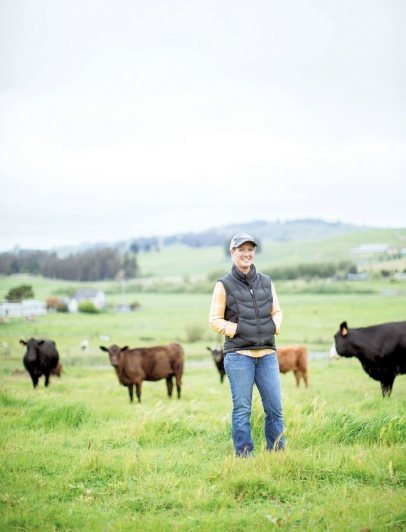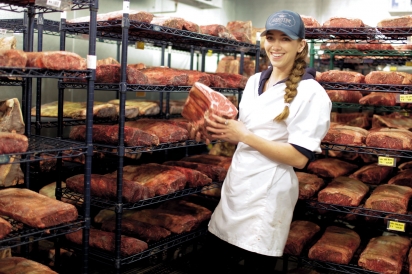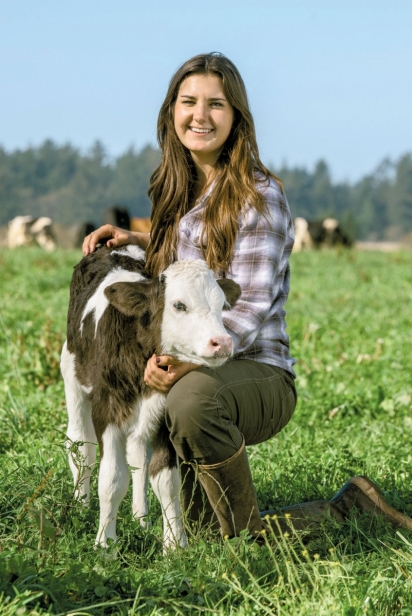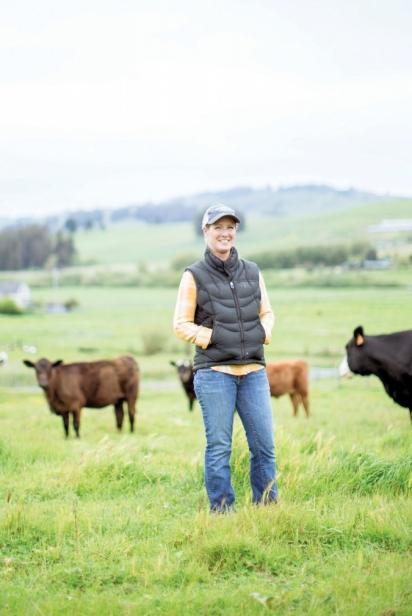Strong Roots Provide Wings to Grow
NEXT GEN LADIES OF GOOD MEAT AND DAIRY
“I don’t sit down much, so there aren’t many places to sit and talk,” said Julie Rossotti, hopping out of her pickup truck. She invites me into the back office of her Rossotti Ranch, behind the walk-in freezers and furnished with two stools and an empty counter, for our interview.
“I don’t sit down much” might be the best way to characterize any entrepreneur, but it seems especially true for Rossotti and the two other women I interviewed for this story, all three next-generation women who stepped into their family businesses in the agricultural industry.
Julie Rossotti is a progeny of West Marin’s storied Grossi family, with deep roots in the local ranching community. Like Katie Flannery of San Rafael–based Flannery Beef, and Vanessa Alexandre of Crescent City’s Alexandre Family EcoDairy Farm, Rossotti has evolved from growing up in the industry to playing a leading role in its present and future.
How do these women honor their roots while negotiating modern-day challenges? What kept them in, or pulled them back into, the family trade? What unique challenges do they face as women in this seemingly “man’s world”? What do they see on their road ahead? And, as literal shepherds of the meat and dairy industry, what do they see on ours? Read on to find out.
KATIE FLANNERY, FLANNERY BEEF
Katie Flannery opens the door to her San Rafael butcher shop with a cup of coffee in her hand and wearing a blood-stained white coat. She invites me in for a tour on a day that the facility is particularly crowded in preparation for a large order being shipped to Switzerland, she explains as she pushes tall racks of aging steaks and roasts around with more ease than most people have handling a cooked steak. Flannery grew up helping with all aspects of her father’s butchery business, experiences that taught her that “getting her hands dirty was always a good thing.”
The Flannery family’s history in the butchery business began with Katie’s grandfather, Bryan Flannery Sr., whose San Francisco butchery, Bryan’s Quality Meats, earned a reputation with celebrities and other luxury food experience seekers throughout the West Coast. Her father, Bryan Flannery Jr., branched out to open the now-closed meat market and deli Bryan’s Fine Foods in Corte Madera. Flannery Beef, in its current iteration as a butcher and meat purveyor—with Katie and her dad as partners—has become synonymous with high quality dry-aged prime steaks offered in high-end restaurants throughout the U.S., and the world.
The company’s success rests largely on the family’s mission to search beyond the highest industry standard, “USDA Prime,” seeking the widely recognized marker of an exceptionally juicy, flavorful steak: marbling. Marbling refers to the white flecks and strains of fat within the lean sections of meat. Flannery prefers widely diffused marbling rather than fewer, larger strains of fat, and in pursuit of this standard they surveyed the country for small ranchers producing meat with this quality, finding a niche with a Southern California ranch specializing in Holstein cattle, typically a dairy breed. Add the Flannerys’ custom dry-aging and specialty cuts, and it’s no wonder Flannery Beef has become a favorite for chefs and steak lovers worldwide.
Flannery doesn’t mention sustainability or the environment during our interview, a notable difference from most conversations around food in the Bay Area, but she fits squarely into the ethos of our food mecca by encouraging consumers to think of meat as a luxury item, to be consciously savored.
“In my own age group there will be times when we go out to dinner and someone will say, ‘This is way too expensive,” she said. “But from my perspective, if you’re not doing it that often and the menu showcases a good item, then it’s worth it. Because there really is a difference between good food and bad food. There can be really important moments in your life that you should celebrate with good food and with good wine, and understand that you’re not eating a $10 steak from Costco.”
Flannery didn’t always plan on staying in the meat business, and, in fact, it’s thanks to a disinclination for chemistry that she ended up wielding a knife again.
“I wanted to be an art historian,” she said. “But turns out that art history has a huge basis in chemistry, which I failed twice.” She left college and came back to help her father with the company’s website. From there, Flannery dove back in, setting up an e-commerce site and modernizing the business’ infrastructure to handle what would soon become exponential growth.
The company has expanded from seven wholesale accounts to 125 in three years. While the bulk of their restaurant clients are in the Bay Area, their Los Angeles market has shot up to around 50 clients in two years. Last year, they shipped to individual customers in every state.
Flannery said the double status as a young woman felt particularly challenging starting out in the business. “There was this perception: ‘OK, you’re 22 or 23, what could you possibly know about beef production?’ But my sisters and I grew up thinking that if you hit a wall, just figure out a way around it,” she said. “Anytime I was questioned about what I knew, I just proved that most of the time I knew exactly what I was talking about.”
As for the future, she’s looking forward to catching up to her father’s level of knowledge and experience. “It probably took him 50 years to learn what he’s learned,” she said. “And I expect it’ll take me the same.”
VANESSA ALEXANDRE, ALEXANDRE FAMILY ECODAIRY FARMS
The Alexandre Family Farm is shared by many living beings. Cows graze. Chickens peck. Pigs root around. Every spring and fall, geese pass through to forage on the pastures, building reserves for their long flights to and from breeding grounds. In 2009, a herd of 52 Roosevelt elk crossed the Smith River onto the property and have since doubled their number. A family of bald eagles nests in the trees. Stewarding them all is the Alexandre family, including Vanessa Alexandre and her four siblings.
Alexandre is the oldest daughter of the pack, and she never doubted that her future would be on the farm. Her parents, Stephanie and Blake, bought their property in Crescent City, nestled between the redwoods and Pacific Ocean, in the late ’80s and have since expanded to operate four grass-based organic dairies with 4,200 crossbred milk cows on about 4,000 acres of irrigated pasture. They also raise chickens for eggs (a business started and run by the Alexandre kids), hogs and grow the majority of their own hay on about 2,500 acres of organic cropland in Modoc County. According to them, Stephanie and Blake went organic in the late ’90s because they felt that was the best way to provide nutritious food to their family and others, to help the environment and to preserve something greater than just a family business. They also wanted their children to continue in the family’s farming business and believed the shift would make the business viable for the future. It appears to have been the right move, as the farm now provides jobs to over 100 people.
The baton Alexandre and her siblings are being passed is not a light one. The Alexandre Family Farm operation is a standout for its holistic approach to farming and animal husbandry. At the root (pun intended), they’re grass farmers, which means that nutrition for their entire community—the livestock, the wild animals, the environment and their customers—begins with the soil. It’s a complex system of attending to the grasses, choosing the right animal breeds, caring for wetlands and improving the natural environment in coordination with other conservation efforts.
Growing up, the Alexandre kids helped with day-to-day duties, each carving out their own particular interest among the many responsibilities of the farm. Alexandre’s younger sister, for instance, took an interest in machinery and at only 19 is the best equipment operator in the family. Alexandre adopted her mom’s two strongest interests: nurturing their cows and nutrition education.
She’s in her element working hands-on with the cows of all colors that graze on the farm.
“As a mother, watching my daughter, it chokes me up to see her so passionate about the animals, working out there out there alongside my husband,” said Stephanie Alexandre.
Over the last 15 years, the family has been crossbreeding Jerseys into the herd with a bit of other New Zealand and German breeds. The whole herd is now 100% crossbreeds, allowing them to pick and choose traits desirable for a grazing dairy. Cows feed only on fresh pasture or dried forages, a practice rooted in the family’s passion not just for healthy animals, but healthy people. Grass-fed cows produce milk high in CLA (a good fat), vitamins E and K and a high ratio of omega-6 to omega-3 fatty acids.
“I was always drawn to working with the young calves, learning about animal nutrition, human nutrition and really understanding what humans need to eat,” said Alexandre. “My mom has always been so involved in nutrition education, it’s all second nature. I just grew up knowing bone broth is good for you and healthy fat is the way to go.”
The family encourages community involvement on the farm through their Bucket Calf program, in which kids aged 5 and older visit the farm to care for a calf, bringing their entire families on the weekends to learn about farming.
The family recently achieved a long-time dream of moving beyond just supplying cheesemakers (including Humboldt Creamery and Rumiano Cheese) to launch their own dairy line and expanding their market into the Bay Area.
The addition of value-added dairy products and the Alexandre Kids Eggs line are two of the ways in which Alexandre hopes to bolster the family’s business to help shelter it from fluctuations in the fluid milk market, a concern for all dairies. The granddaughter of the only woman to chair the California Milk Advisory Board, she certainly has the genealogical chops to succeed. Of her maternal grandmother Bea Moon, Alexandre said “she was a hero. We grew up with aspirations to do big things.” Alexandre seems well on her way to doing exactly that.
JULIE ROSSOTTI, ROSSOTTI RANCH
In 1892, Julie and Tony Rossotti’s respective great-great-grandfathers left the mountains of Switzerland to emigrate to the United States. What the men knew was cows and dairy products, so they settled in West Marin, working side-by-side in the ranching community. Fast-forward a couple of generations and their great-great-grandchildren Tony and Julie met and fell in love, continuing their families’ storied legacy with their own ranching venture, Rossotti Ranch.
Rossotti’s parents had decided to pursue raising beef cattle instead of the dairy business they had grown up in. “I witnessed the support my grandparents showed my parents when they chose to transition the family dairy to raising beef cattle, even though my grandparents did not understand the beef cattle industry,” she said. “I grew up with my parents constantly learning in an industry new to them and that is something that instilled in me the confidence to try new things.”
Like Alexandre, Rossotti comes from a long line of women in agriculture.
“My grandma always had an active role in the industry and so did many of the other women in the community, but they also played a role on the ranch whether it was caring for the employees and their families or growing food,” she said. She’s quick to credit her own mother for encouraging her interest in animal husbandry and instilling a deep sense of how animals should be treated in conjunction with the land around them.
Rossotti recalls knowing what she wanted to do with her life when she was just 5 years old, but it’s an odd feeling to know your calling that early. How can you be sure? Before committing to ranching full-time, Rossotti worked in the travel industry, then moved closer to her true calling working for the Marin Agricultural Land Trust (MALT). Although she enjoyed working to preserve farmland, she said she realized that she was in a unique position to make an impact by working directly on the ranch, producing food for her community.
Soon after leaving MALT, Rossotti met her now-husband, Tony, and the two combined their nine generations of ranching heritage to buy their own property and form the Rossotti Ranch label offering pasture- raised veal, grass-fed goat and chicken.
Rossotti is passionate about breaking the stigma of veal, citing that Rossotti Ranch calves are naturally bred and humanely raised alongside their mothers on open coastal pastures for the entirety of their lifespans—around six to eight months, about the same age as pork and lamb.
“Most veal in the U.S. comes from the dairy industry. Calves are separated from their mothers shortly after birth and fed supplemental milk,” she said. On the Rossotti Ranch, calves live on wide-open pastures, and consume only their mother’s milk, and grass and hay that has been organically or sustainably grown.
Rossotti Ranch uses rotational grazing techniques to maintain healthy forage in the pastures, giving each pasture rest between rotations. They are also committed to protecting natural watershed and riparian areas to help sensitive species and habitat thrive.
Rossotti continues her good work off the farm, too. She just completed a nine-year term on the board of MALT, and serves as a director for Agricultural Institute of Marin, which operates the San Rafael Civic Center farmers’ market where you will find Julie most Sundays, “manning” the Rossotti Ranch market stand.
When asked if she had encountered any challenges as a rancher and entrepreneur that she felt were specifically due to her gender, she responded, “Yes, it can be challenging to be a woman in what many people think of as a more traditionally male-dominated industry. But all my life I have grown up around strong women who worked in their family business, so it’s really nothing that I am not used to.”
Looking toward the future, Julie and Tony are raising their son, Rocco, with an appreciation for the land and animals, as they were taught by their ancestors. “I am an example of the next-generation rancher who has created a business that complements, and adds to, my family’s existing beef operation.” she said. “I hope that through our efforts and success, others will be inspired to continue their family legacies, continuing to produce food for their communities.”








